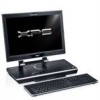Dell XPS M2010 Owner's Manual - Page 51
Setting Display Resolution and Refresh Rate, Dual Independent Display Mode, Start, Control Panel - graphics card
 |
View all Dell XPS M2010 manuals
Add to My Manuals
Save this manual to your list of manuals |
Page 51 highlights
Press to switch the video image between the display only, the external device only, or the display and the external device simultaneously. Highlight your display choice and the display is selected when you release the keys. Setting Display Resolution and Refresh Rate NOTE: If you change the display resolution from the current settings, the image may appear blurry or text may be hard to read. Before you change any of the display settings, make a note of the current settings for future reference. To display a program at a specific resolution, both the graphics card and the display must support the program, and the necessary video drivers must be installed. NOTE: Use only the Dell-installed video drivers, which are designed to offer the best performance with your Dellinstalled operating system. If you choose a resolution or color palette that is higher than the display supports, the settings adjust automatically to the closest supported values. 1 Click Start→ Control Panel→ Display. 2 In the Display Properties window, click the Settings tab. 3 Try different settings for Color quality and Screen resolution. NOTE: As the resolution increases, icons and text appear smaller on the screen. If the video resolution setting is higher than that supported by the display, the computer enters pan mode. In pan mode, the entire screen cannot be displayed at one time. For example, the taskbar that usually appears at the bottom of the desktop may no longer be visible. To view the rest of the screen, use the touch pad to pan up, down, left, and right. NOTICE: You can damage an external monitor by using an unsupported refresh rate. Before adjusting the refresh rate on an external monitor, see the user's guide for the monitor. Dual Independent Display Mode You can attach an external monitor or projector to your computer and use it as an extension of your display (known as "dual independent display" or "extended desktop" mode). This mode allows you to use both screens independently and drag objects from one screen to the other, effectively doubling the amount of viewable work space. 1 Connect the external monitor, TV, or projector to the computer. 2 Click Start→ Control Panel→ Display. 3 In the Display Properties window, click the Settings tab. NOTE: If you choose a resolution or color palette that is higher than the display supports, the settings adjust automatically to the closest supported values. For more information, see your operating system documentation. 4 Click the monitor 2 icon, click the Extend my Windows desktop... check box, and then click Apply. Using the Display 51















